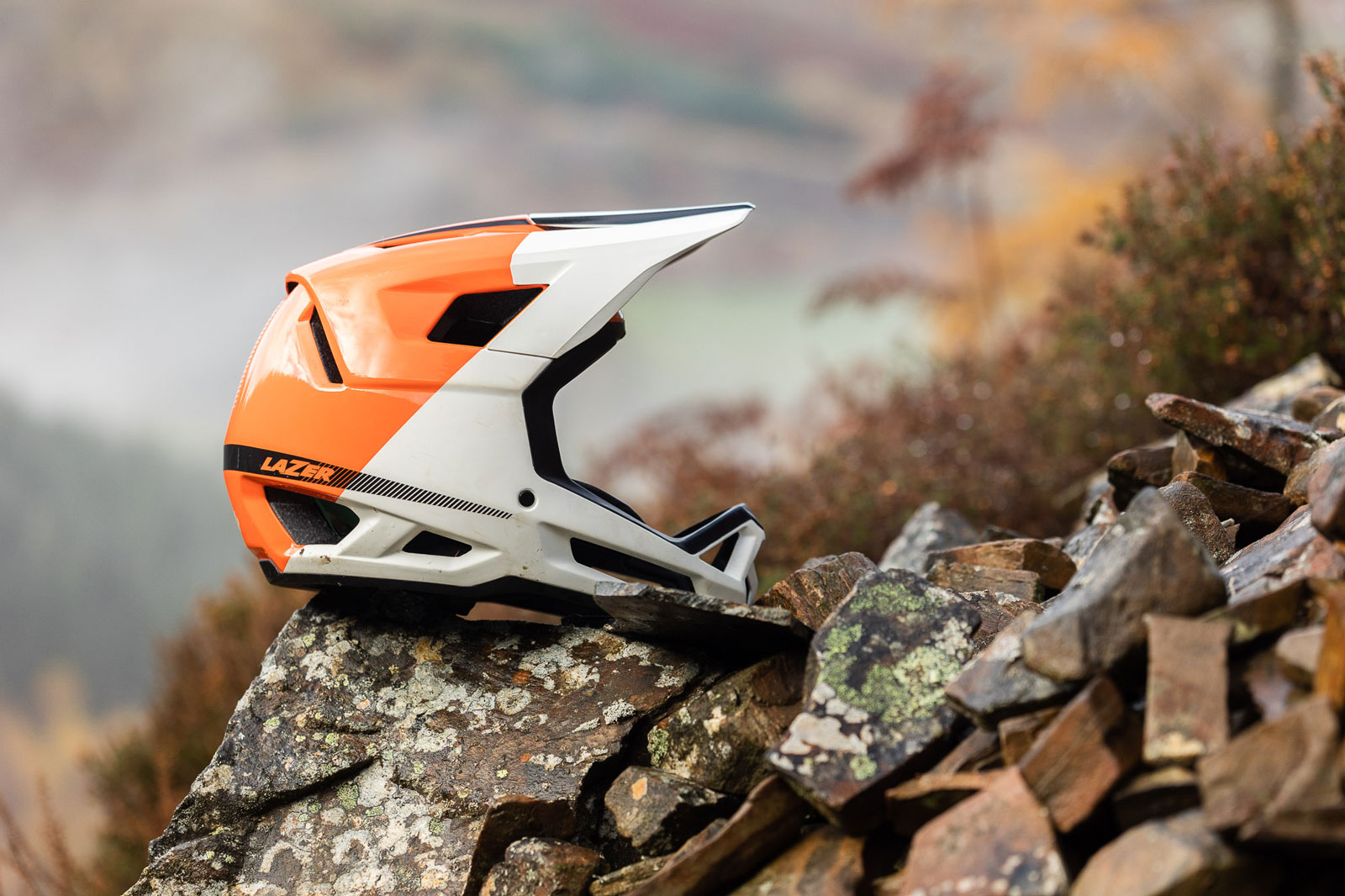Last year, Lazer introduced an all-new rotational impact protection technology for their range of on- and off-road helmets. The KinetiCore concept actually removes energy-absorbing EPS foam in strategic locations throughout the helmet body in order to create variable size and shape blocks. The result? The creation of “controlled crumple zones”, conceptually similar to the crumple zones seen on vehicles.
KinetiCore debuted on the Lazer Jackal KinetiCore half-shell mountain bike helmet, but has since been rolled out to the Coyote Trail Helmet, the Tonic Road Helmet and more. We tested the Jackal, and were seriously impressed with how airy the helmet felt thanks to the unusual layout of the EPS.
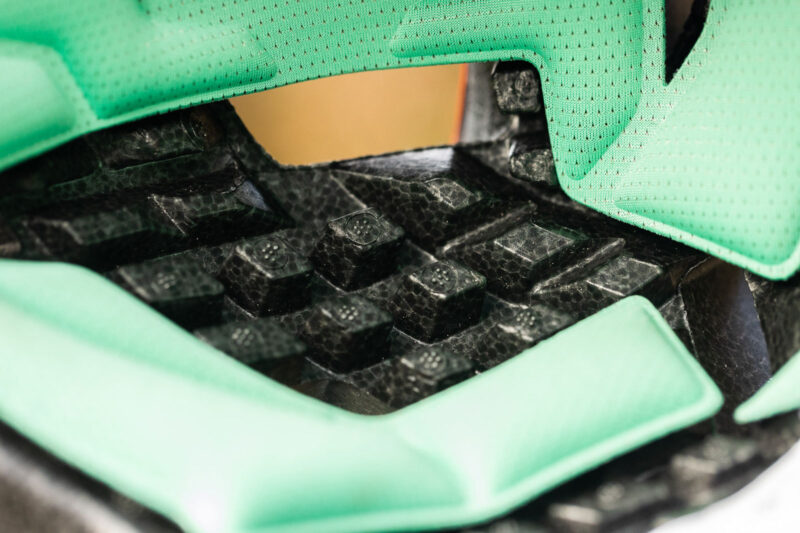
Most recently, the KinetiCore technology has found another home on an ASTM approved full face helmet; the Lazer Cage KinetiCore, reviewed here. Though it is certified for downhill, this one comes in under the 1 kg mark at 901 grams in a size small and is arguably more suited to trail and enduro riding.
A comparatively low weight, along with the presence of 12 vents on the main body and 7 vents on the chin guard, make the Lazer Cage KinetiCore an attractive option to those who want downhill levels of protection on the days where no shuttle is available, or wanted, even.
Another major selling point of the Lazer Cage KinetiCore is its 5 Star rating from independent helmet testers, Virginia Tech. It is currently only one of two full face helmets to have a published rating from Virginia Tech (brands are not obliged to have the results published); the other is the recently announced Bluegrass Vanguard Core. Without further ado, here are our impressions of the Lazer Cage KinetiCore full face helmet.
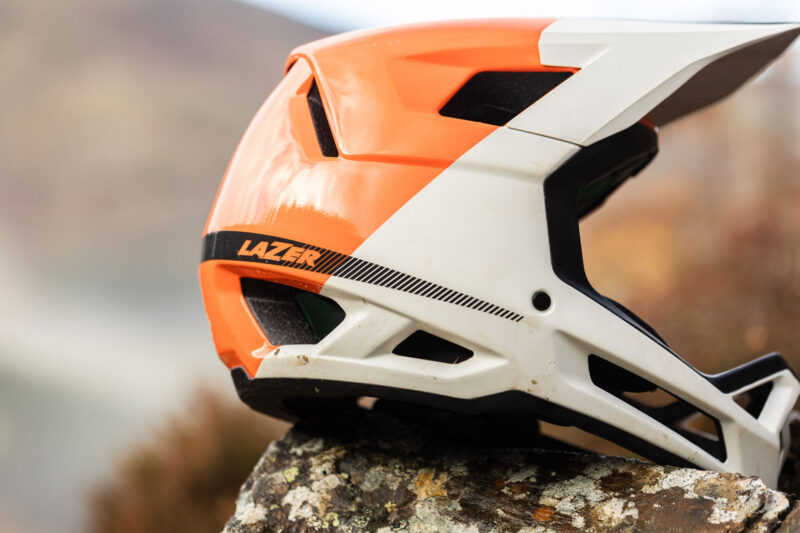
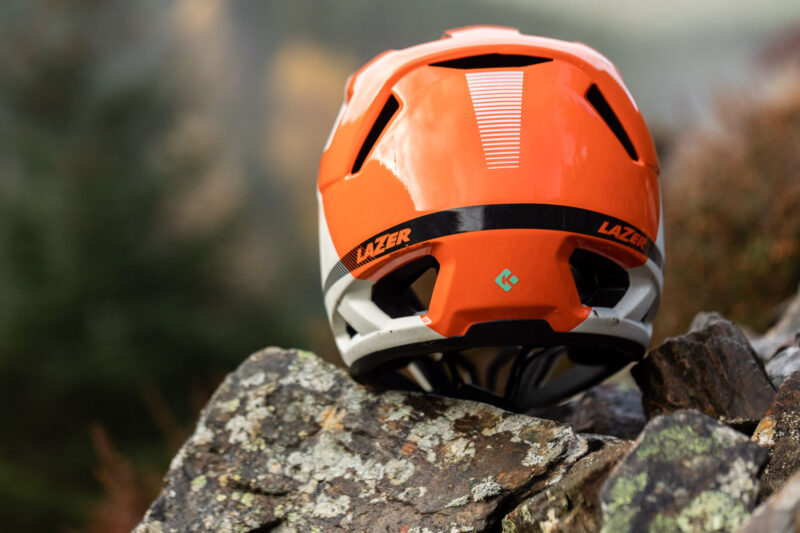
Review: Lazer Cage KinetiCore Full Face Helmet
Straight up: the Lazer Cage KinetiCore is a favorite of mine. It strikes an excellent balance of weight, ventilation and comfort. The more detailed review follows…

I have a head circumference of around 54cm, and was initially provided with the Small option recommended for head circumferences of 54-56 cm. My first impressions were very good. Instantly, I felt this was a very comfortable helmet, offering no particular pressure points about my skull. Rather, I feel that pressure from the helmet’s internal shape is evenly applied across my head.
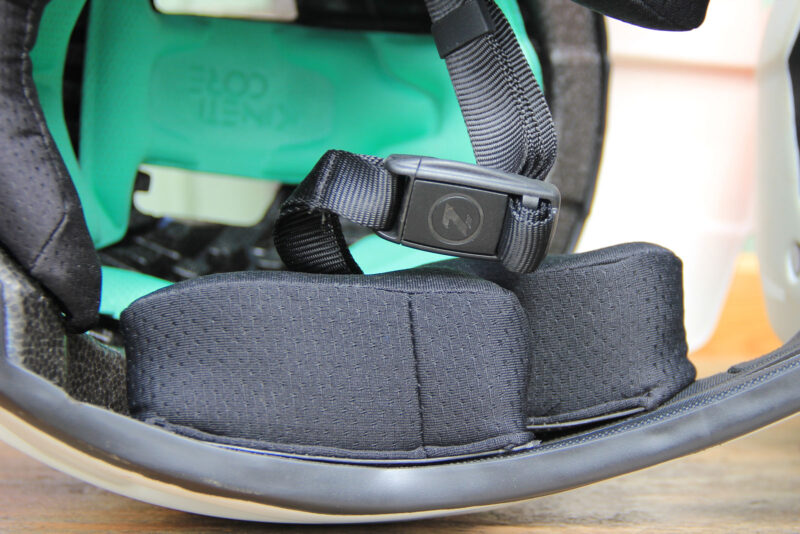
The helmet does not have the retention system that some modern full face helmets offer, like the Specialized Gambit and Abus Airdrop. The chin strap relies only upon a magnetic closure from Fidlock, a lightweight alternative to the D-Loop closure that is commonly in use on motorcycle helmets. And, I like it. It’s a simple, effective design that makes putting on and taking off the helmet a more straight-forward affair, and I don’t feel it compromises on safety in any way.
Shaking my head vigorously, I will say it does feel like the helmet is ever so slightly on the roomy side, which is not altogether surprising given that my head is on the smaller end of the suggested range for this size. For this reason, I did ask Lazer to send me the XS (52-54cm) to try for good measure.
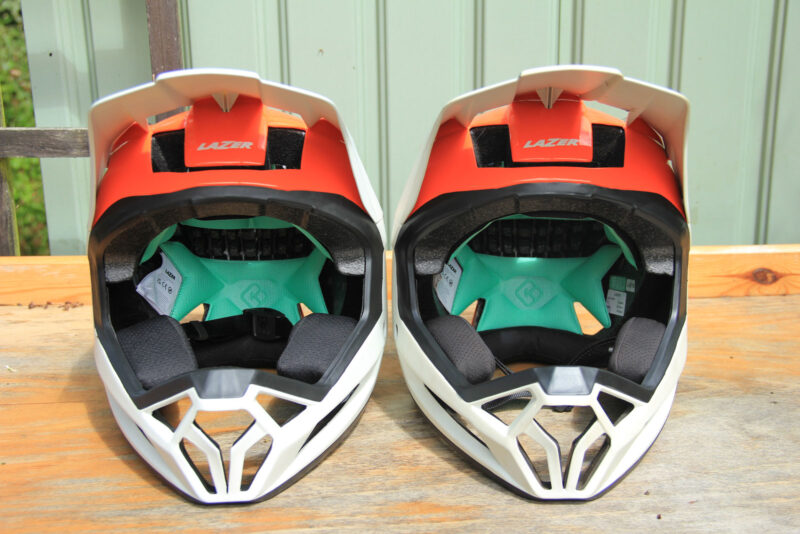
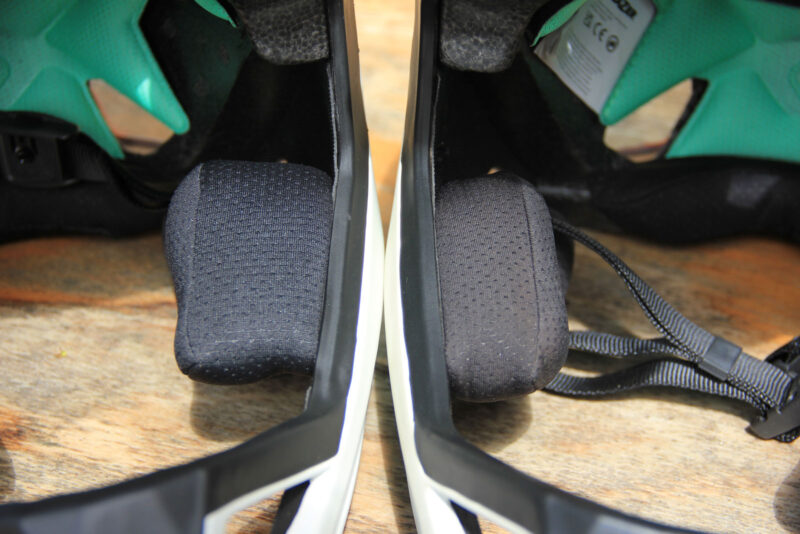
The XS and S helmets actually have the very same shell size, with a narrower fit provided only by some extra chunky cheek pads on the XS. Indeed, they were too chunky for me, squashing the back of my cheeks rather uncomfortably. Thus, I determined the Small gave the better fit of the two.

The cheek pads on the Cage KinetiCore are biased forward toward the chin guard. They don’t interfere with my ears at all, so I can hold a conversation with friends on social rides without struggling to hear what they’re saying. The cheek pads are removable though, so there’s always the option to stow them up under your goggles on long, hot climbs, something we see the professional enduro riders doing frequently. Obviously, it’s imperative that you remember to pop them back in before dropping into the trail.
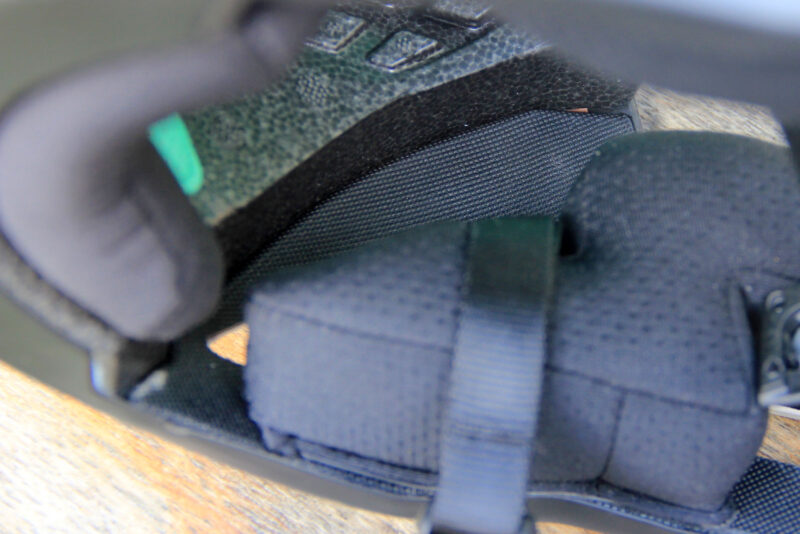
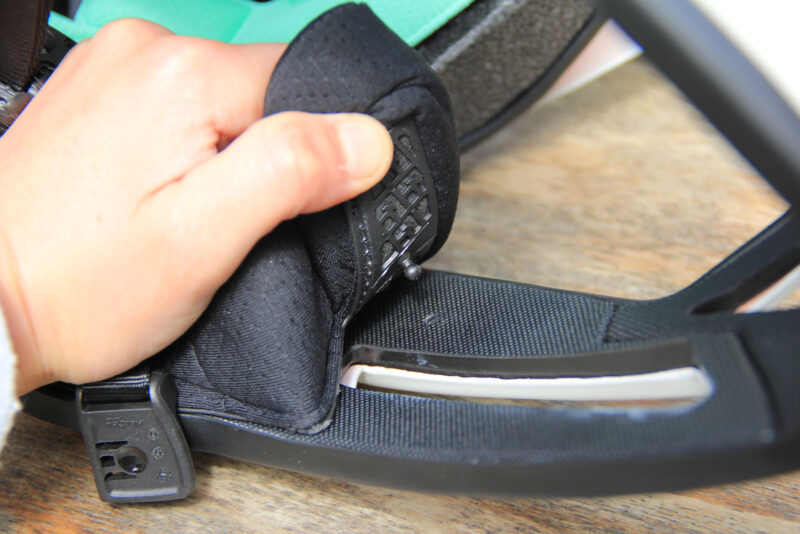
A reasonable amount of force is required to remove the pads from the inside of the chin guard*. Popping them back in is a simple affair. The pads remain firmly attached to the chin guard when repeatedly putting the helmet on and taking it off, which is sadly not the case for the ultra lightweight Specialized Gambit.

The Lazer Cage KinetiCore worked nicely with my preferred Smith Squad goggles. At the interface between the top of the goggles and the forehead region of the helmet, there are two very subtle indentations in the EPS. Manufacturers often contour the EPS more aggressively here to increase ventilation at this region where sweat tends to build up. I can’t say I suffered for that, though, likely because the weather has been favorable and the Smith Squad goggles offer huge ventilation holes around the rim of the lens.
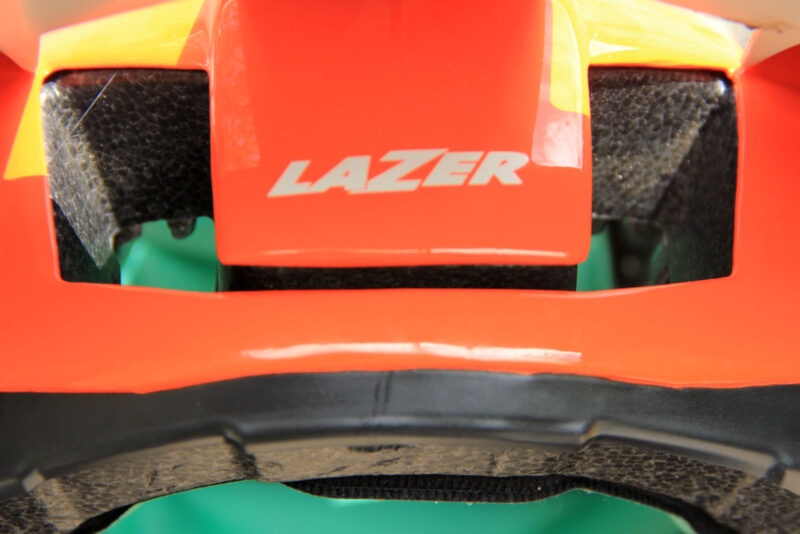
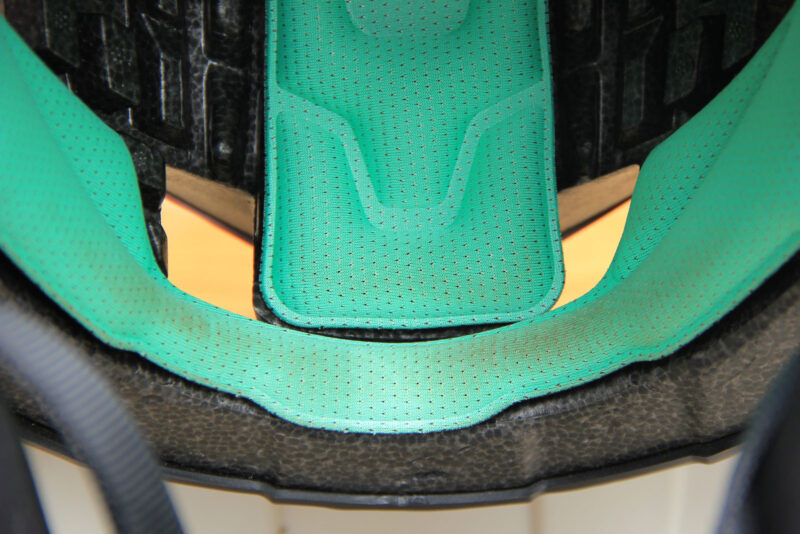
Elsewhere, the helmet performs extremely well on the ventilation front. What looks to be two separate vets is actually a massive single vent underneath the peak. It funnels airflow into the maze created by plethora EPS structures throughout the body of the helmet. With so much hair on my head, I am limited in my capacity to appreciate this feature, but folks with less hair (or none) will seriously benefit from the KinetiCore’s next-level airy design.
There are four more intake vents on the Cage KinetiCore, all of which funnel air into the internal maze of EPS in a similar fashion. At the back of the helmet are no fewer than seven exhaust vents that help the moisture-saturated air escape.
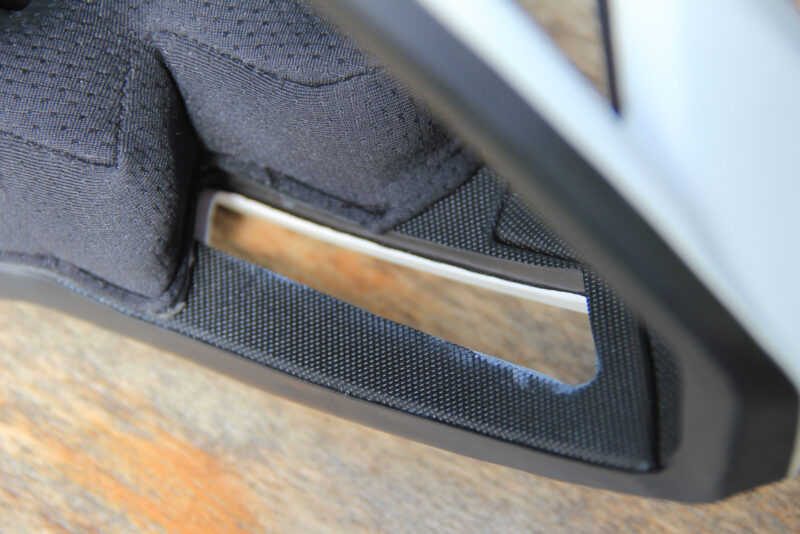
The chin guard has huge ventilation holes down the side, but these are limited in their ability to generate meaningful airflow due to the placement of the cheek pads. Regardless, I have experienced many a pleasant hill climb in warm, summer conditions while wearing the Lazer Cage KinetiCore, and I rate its comfort and ventilation highly therefore.

The Lazer Cage KinetiCore has a fixed peak so you cannot store goggles underneath it. The design focus here was to ensure the peak would break away from the helmet body easily upon impact, so as to prevent it transferring any more rotational forces to the wearer’s neck in a crash scenario. In a video that can be viewed on the product page, Lazer show how the fixed visor is a safer option over an adjustable visor with bolts.
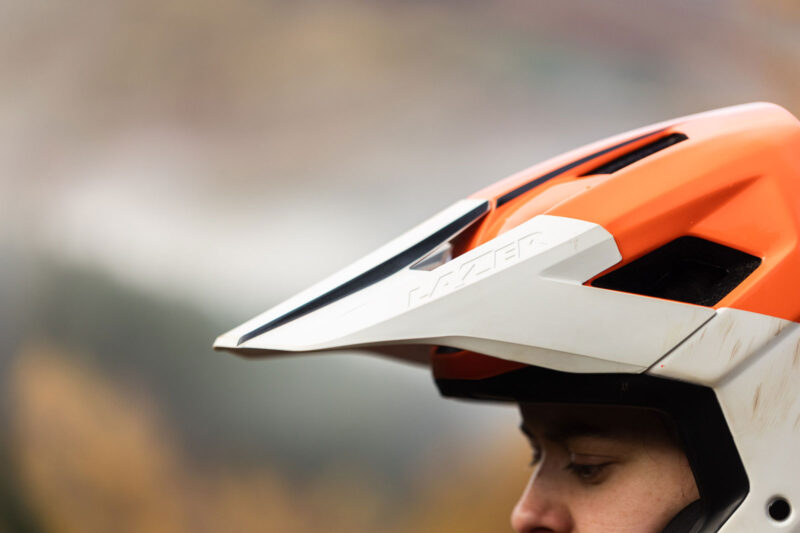
*Lazer Cage KinetiCore Rolling Updates
Since the initial launch of the Cage KinetiCore just under a year ago, Lazer has updated a couple of the features to improve it overall. Helmets available on the market from July of this year will have a peak that is 5mm shorter, a change implemented to improve the field of view. Also, the little plastic mushrooms on the current cheek pads will be replaced by thicker flat pins that are said to improve ease of cheek pad removal and re-attachment.
What about the KinetiCore?
Thankfully, I haven’t been given the opportunity to test this helmet in the true sense, so I can’t comment on ability of the KinetiCore layout of EPS to absorb impact. For that, we must turn to the helmet’s safety certifications. Indeed, this lightweight full face helmet is ASTM approved with the following certifications: ASTM 1952 for DH, as well as NTA 8776, which is the Dutch helmet certification for speed bikes and e-bikes with a maximum speed of 40 km/h.
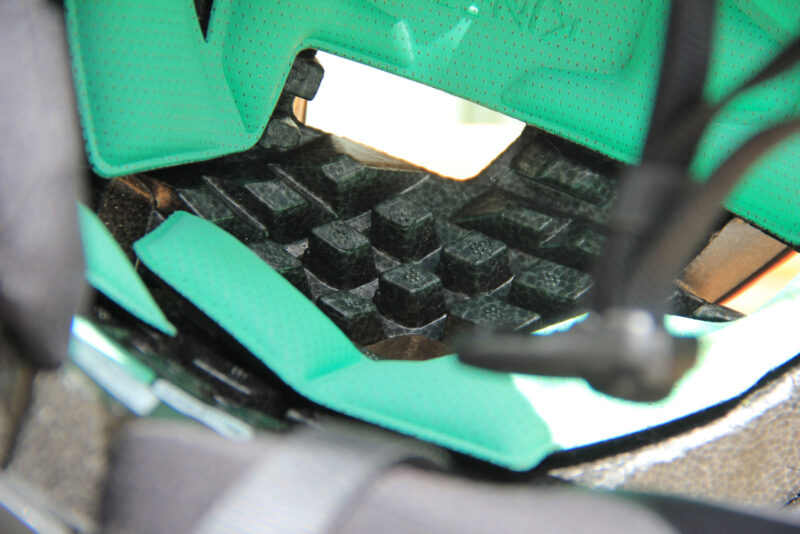
Interestingly, when I flex the helmet by applying force with my hands placed either side on the shell, the polycarbonate shell looks to move away from the EPS liner, indicating that the two are not in fact bonded to one another entirely.
We asked Peter Duynslaeger, Lazer’s Commercial Director, about this. He says, “Yes that is definitely intentional. Part of the reason why this helmet is currently the only1 full face helmet on Virginia Tech helmet rating listed with 5 stars is because of KinetiCore. Not only on the inside of the EPS where you see the EPS crumple zones, but the outside of the EPS consists of cylindrical cones and only these cones are connected to the outer shell. This allows – in an impact – for movement between the outer shell and the EPS liner (where it’s not connected to the outer shell) and contributes in battling rotational forces”.
1Editor’s Note: The Bluegrass Vanguard Core also has a 5 Star Rating from Virginia Tech.
Lazer Cage KinetiCore | Final Thoughts
The Lazer Cage KinetiCore is a really comfortable full face helmet that is the cream of the crop for ventilation. It is light enough for enduro racing; read – two back-to-back 6 hour days in the saddle, but not too light to the point where you feel vulnerable in it. I feel it toes the line well, and will satisfy a large proportion of riders out there – as ever, presuming they can get a good fit.
On balance, we think the £250 $/ 300 retail price for the Lazer Cage KinetiCore is fair. Without completing a comprehensive cost analysis, here are some reasons we’ve come to that conclusion.
It is a good £100 more expensive than the 602g Specialized Gambit, but in my opinion is by far the better quality helmet. For me, helmet weight shouldn’t be a race to the bottom.
Furthermore, the Lazer helmet is £10 cheaper than the, admittedly lighter, Abus Airdrop; while that helmet also strikes a good balance between weight and ventilation, it doesn’t beat the Lazer Cage Kineticore on comfort.
Other helmets that will set you back £249.99 (or around about that) include the Smith Mainline and the Giro Insurgent. While the former adds appeal with both Koroyd and MIPS protection, it does have an adjustable visor with pins that are, sadly, liable to falling out. The Giro offering is much heavier, and less well ventilated than the Lazer Cage KinetiCore.
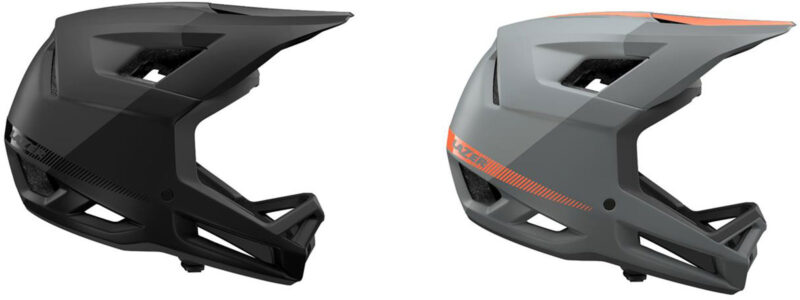
Pricing & Availability
The Lazer Cage KinetiCore retails at £250 / $300 and is available now at retailers worldwide in XS (52-54cm), Small (54-56cm), Medium (56-58cm), Large (58-60cm) and XL (60-62cm). In addition to the White/Orange option pictured throughout, there is a Matte Black and a Matte Cobalt option (that isn’t Cobalt colored at all).

